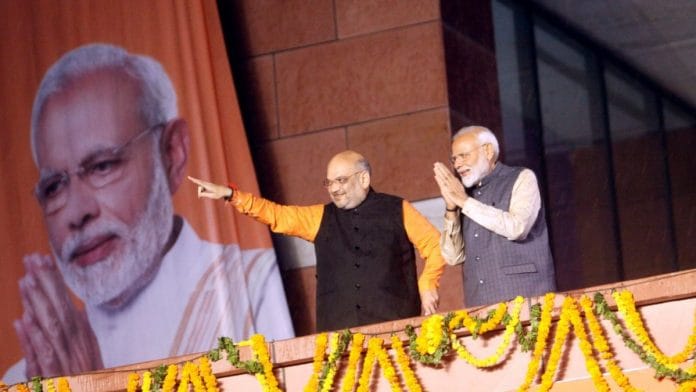New Delhi: Prime Minister Narendra Modi and BJP president Amit Shah have much at stake in the assembly elections in Maharashtra and Haryana next month – stakes that extend much beyond the geographical boundaries of these states.
For Modi, it’s no longer a question of his continuing popularity or personality cult. The results of these assembly elections will have no bearing on them either way. The 2019 Lok Sabha elections have answered those questions adequately and in no uncertain terms.
What is at stake for him in these state polls is the political worth of leaders who have come to be known as ‘Modi’s Men’ – Manohar Lal Khattar in Haryana and Devendra Fadnavis in Maharashtra.
They were the first crop of chief ministers Modi picked after coming to power in 2014. Will they justify Modi’s trust in them and prove him a visionary leader who gifted India a new generation of mass leaders? Or, will they turn out to be the poor choices borne out of the hubris of a mass leader?
Not that the BJP didn’t lose assembly elections after 2014. In fact, the Modi wave couldn’t ensure the BJP’s victories in many states such as Delhi, Bihar, Punjab, Karnataka (where it’s since managed to wrest power), Madhya Pradesh, Chhattisgarh and Rajasthan. It also virtually lost in Goa but managed to form a coalition government.
But the BJP’s faces in these states (excluding Punjab where Shiromani Akali Dal was the leading partner) were not Modi’s choices and predated his arrival on the political centre stage in Delhi. The coming elections are about the political mettle of Modi’s Men.
Also read: Shiv Sena & BJP need each other in Maharashtra, but it all boils down to who blinks first
The unstoppable election machine
For the BJP president, these assembly polls are an opportunity to set the record straight: That the BJP’s rise to the pinnacle in Indian politics might have to do with Modi’s popularity and personality cult but the BJP is there to stay and “rule for 50 years”.
Amit Shah has been credited with the transformation of the party organisation into a formidable, election-fighting machine, which can work as a juggernaut even without being propelled by any personality cult. These elections are likely to test it more than ever.
The common perception has been that the BJP’s victories in one state after another since December 2013 have all been because of the Modi wave. It was partly true as election reports from the ground in one opposition-ruled state after another clearly suggested that people were voting for Modi even in assembly elections, expecting him to deliver on their dreams and aspirations, no matter who he chose as chief ministers.
Many reasons could be proffered to explain the BJP’s losses in each of these states — people’s fancy for the Aam Aadmi Party in Delhi, mahagathbandhan or grand alliance of opposition parties in Bihar, unpopularity of SAD-led government in Punjab, strong anti-incumbency against 15-year-old BJP governments in Madhya Pradesh and Chhattisgarh, and a massive dislike for Vasundhara Raje in Rajasthan, among others.
None of these factors seem to be prevalent in the poll-bound states this time where the opposition parties seem to be in disarray. There is no palpable resentment against the incumbent chief ministers either; they rather enjoy a fair degree of popularity.
Modi continues to be popular in these states but this may not be a decisive factor in the elections because voters would now judge ‘Modi’s Men’ in terms of their delivery in fulfilling the dreams and aspirations that the prime minister had stoked while canvassing for the BJP.
That’s why the BJP’s formidable organisational machinery, built by Amit Shah, has more to prove in the coming elections than it ever had to.
Also read: Ahead of polls, Haryana BJP govt enrols 80% farmers in PM’s pension scheme in a week







Co-operative Federalism in India is now seem to be in only statute books. Fast losing practical utility in Indian democracy as far as policy matters are concerned. Some state here and there are opposed and discredited by the Union Government. The ruling party at centre denies this. But the citizens feel centre has a strong say in running a state. The elections for the state are fought on national issues and the PM canvasses for all the states. This kills the spirit of federalism in India.
Amit will decide one’s Loya-lty before making them a candidate.